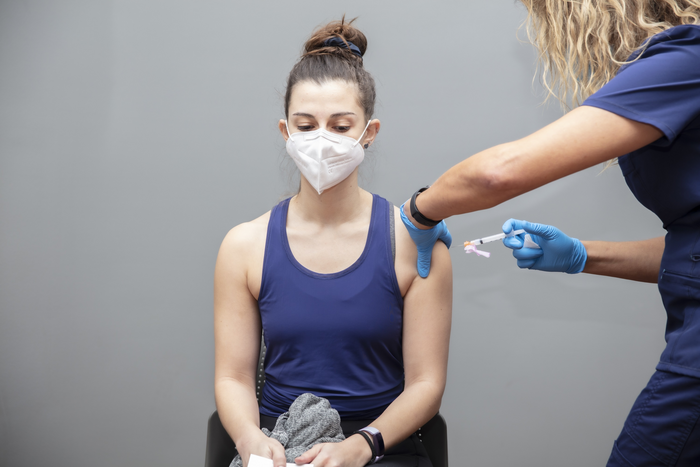As the world enters a post-pandemic phase, an international study is providing unique perspectives on COVID-19 vaccine hesitancies among college students.

Credit: Alex Dolce, Florida Atlantic University
As the world enters a post-pandemic phase, an international study is providing unique perspectives on COVID-19 vaccine hesitancies among college students.
Researchers from Florida Atlantic University, Ariel University in Israel, and the University of West Bohemia in Pilsen, Czech Republic, are the first to perform a cross-cultural comparison to investigate factors that influenced the decision to get the COVID-19 vaccine in an international sample of college students from the United States, Israel and the Czech Republic.
The study explored associations between vaccine hesitancy and the Health Belief Model (HBM), a tool that helps researchers better understand motivations to health-related behavior. Researchers explored perceived susceptibility, which addresses perceptions of the risk of acquiring a disease; perceived severity, which addresses beliefs regarding the seriousness of contracting the disease; benefits, and perceived barriers, which refer to perceptions regarding the difficulty of performing a recommended action in preventing a disease.
From August through December 2021, researchers distributed an online survey in Czech, Hebrew and English. Participants completed the anonymous self-reporting questionnaire designed to obtain information on demographics, health belief perceptions, and COVID-19 vaccination status. Researchers ascertained the influence of perceived susceptibility, severity, benefits and barriers on the likelihood that participants are vaccinated.
Results of the study, published in INQUIRY: The Journal of Health Care Organization, Provision and Financing, provide evidence of country-specific varying perceptions of susceptibly, severity, benefits and barriers associated with a virus and vaccine.
Findings showed that 80.3 percent of the sample self-reported receiving at least one dose of a COVID-19 vaccination. From the Czech Republic sample, 73.5 percent reported receiving the vaccination; 92.5 percent from the Israel sample; and 73.7 percent of the U.S. sample reported having received the vaccination.
The factors of perceived severity and perceived benefits explained 52.6 percent of the variance in vaccination. Researchers also found significant differences between countries for the four HBM factors.
For perceived susceptibility and barriers, the U.S. differed from both the Czech Republic and Israel, while there was no difference between the Czech Republic and Israel. More specifically, the U.S. sample had lower perceived susceptibility, but higher perceived barriers than both the Czech Republic and Israel samples.
Both the Czech Republic and the U.S. samples found perceived severity and perceived benefit to predict vaccination status. Perceived severity of the disease if contracted, was a significant motivator in the U.S. and Czechia but not Israel. The Israel sample found only the factor of benefit to predict vaccination status.
“Experiences and outcomes from the COVID-19 pandemic are of significant value as society moves beyond the pandemic into an unknown future. A future where COVID-19 continues to exist,” said Michael DeDonno, Ph.D., co-author and an associate professor, research methodology, in FAU’s College of Education. “We as a collective of international researchers have endeavored to offer a unique view of collected data from our respective countries.”
While the phenomena of vaccine hesitancy is not new, it has been brought to the forefront due to the COVID-19 pandemic. According to the World Health Organization (WHO), vaccine hesitancy is in the top 10 of global health threats.
“Dealing with the COVID-19 pandemic has been a substantial global challenge,” said Joy Longo, Ph.D., co-author, associate professor and interim associate dean, academic programs, FAU’s Christine E. Lynn College of Nursing. “The different predictors of vaccine hesitancy we found in our study further raises the need for culture specific campaigns and policies implemented by the local government of countries. Rather than a global model for dealing with a virus, governments should consider their own strengths, weaknesses, opportunities and threats in creating an effective model to mitigate the virus.”
The study also provides evidence that policymakers should further promote the benefits of a vaccine and emphasize potential severity of the virus. In addition to highlighting the death rate of a virus, the researchers say it may be prudent to further emphasize the severe and potentially long-term symptoms of a virus.
“To better prepare for a potential future pandemic, it is important to investigate factors that influenced responses to the recent COVID-19 pandemic,” said DeDonno. “The worldwide aspect of the pandemic has provided an environment to better understand the factors that influence the decision to get vaccinated.”
Study co-authors are Corinne Berger, Ph.D., first author, and Uzi Ben-Shalom, Ph.D., Aerial University; and Zbyněk Tarant, Ph.D., University of West Bohemia.
“A more accurate understanding of the risks during a pandemic, may generate better acceptance of prevention practices,” said Longo.
– FAU –
About Florida Atlantic University:
Florida Atlantic University, established in 1961, officially opened its doors in 1964 as the fifth public university in Florida. Today, the University serves more than 30,000 undergraduate and graduate students across six campuses located along the southeast Florida coast. In recent years, the University has doubled its research expenditures and outpaced its peers in student achievement rates. Through the coexistence of access and excellence, FAU embodies an innovative model where traditional achievement gaps vanish. FAU is designated a Hispanic-serving institution, ranked as a top public university by U.S. News & World Report and a High Research Activity institution by the Carnegie Foundation for the Advancement of Teaching. For more information, visit www.fau.edu.
DOI
10.1177/00469580231164229
Method of Research
Survey
Subject of Research
People
Article Title
The Influence of the Health Belief Model on the Decision to Get the COVID-19 Vaccine: An International Survey Study of College Students
Article Publication Date
4-Apr-2023




